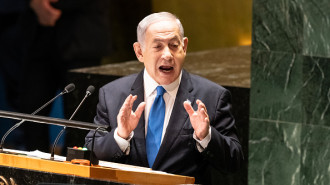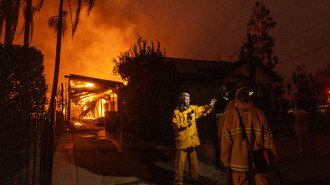Breadcrumb
Israeli officials warning against Egypt's 'military activity' in Sinai
Israeli military and political officials are once more sounding the alarm over what they describe as 'build-up' by the Egyptian military in the Sinai Peninsula, calling for caution and warning against a potential confrontation with Egypt in the future.
Citing Egyptian military activity in the north-western territory, which was liberated by Egypt from Israeli occupation in 1973, the officials referred to logistical preparations and the construction of cement obstacles in central Sinai.
These obstacles, they were quoted by some Israeli media outlets as saying, aim at blocking Israeli armoured vehicles.
Egypt, they claimed, maintains more than a dozen tunnels between Rafah in the Gaza Strip and points deep in Sinai, which have not been demolished yet.
The new warnings come less than a month after a retired Israeli diplomat accused Egypt of violating the 1979 peace treaty with his country by increasing troop presence in Sinai.
David Govrin, who served as Israel's ambassador to Cairo from July 2016 to May 2019 and was Israel's first ambassador to Morocco, told the Hebrew news site, Ynet, last month that Egypt was sending more troops into Sinai than stipulated in the security annex of the treaty.
Egypt is investing, he said, huge amounts of money in the military build-up, even as no other country threatens it and despite its tough economic conditions.
Critical time
Egypt's enhanced security measures in Sinai come at a tough time for the Arab country, Israel and the region.
The Israeli war on Gaza and threats to navigation in the Suez Canal are causes for concern in Cairo which shudders at the prospect of the Israeli war on Gaza seeping out of the Egyptian territory and into Sinai, a piece of land larger than Israel; the occupied West Bank; Gaza, and Lebanon combined.
Egypt is also apprehensive about the Israeli army acquiescing to calls by Israel's far-right for the displacement of Gaza's population of more than 2.3 million into Sinai, a prospect that will, according to Egyptian President Abdel Fattah El Sisi in October 2023, threaten the Egypt-Israel peace.
Citing all these fears, Egyptian military analysts highlight the importance of the measures Egypt is taking in Sinai and find no reason for Israeli concerns.
"Repeated Israeli media reports about special Egyptian measures in Sinai are only part of Israel's psychological warfare which aims to keep ordinary Israelis worried about their country's security," Gen. Ali Hefzi, a former assistant to the Egyptian minister of defence and a former governor of North Sinai, told The New Arab.
"The fact is that Egypt continues to abide by the terms of its peace treaty with Israel, while all of Egypt's security arrangements in Sinai move hand in hand with these terms," he added.
Even before the Israeli war in Gaza, Egypt increased troop presence in Sinai, as per previous remarks by the Egyptian president, in the Arab country's bid to uproot a branch of the Islamic State (IS) group in the north-western territory that stands in proximity to the Suez Canal and the Red Sea.
IS militants, an amalgam of Sinai Bedouins, jihadists from other parts of Egypt and jihadi salafists from Gaza, wanted to establish an Islamic emirate in Sinai.
It took the Egyptian army major military and security reinforcements to succeed in defeating the group, which made parts of northern Sinai no-go areas for Egyptians and scared the Egyptian territory's Christian residents out of it.
Egypt says it also demolished hundreds of tunnels along the Gaza-Sinai border, which were used by IS militants in sneaking into Gaza and receiving supplies from the Palestinian territory.
Nevertheless, the aforementioned military and security reinforcements were made in coordination with Israel, according to the Egyptian president.
Learning the hard way
The 1979 Egyptian-Israeli peace treaty, the first between an Arab country and the self-proclaimed Jewish state, is viewed as a cornerstone of regional stability, having been signed after the Egyptian army's liberation of Sinai from Israeli occupation and following four wars between the two neighbouring countries.
The same treaty institutes limits to the number of troops and type of military hardware Egypt and Israel can deploy on each side of their shared border. It also regulates the type of troops to be deployed in other parts of Sinai.
Nonetheless, the lesson Egypt learned from its decade of counterterrorism operations in Sinai is that this territory should not remain empty or undeveloped as it was for decades after its liberation from Israeli occupation and the signing of the Egyptian-Israeli peace, analysts in Cairo said.
"Egypt paid a heavy price for overlooking the development of Sinai for decades in the past," Tarek Fahmi, a professor of political science at Cairo University, told TNA.
"This lack of development contributed to turning this Egyptian territory into a fertile land for extremism and terrorism," he added.
Covering an area of 60,000 square kilometres and inhabited by 400,000 people only, Sinai was consigned to oblivion—as far as development was concerned—for many decades in the past.
This territory's residents even used to complain of discrimination from state institutions, including the army and police which reportedly did not allow the draft of Sinai residents, let alone their admission into the Police Academy which churns out thousands of police officers each year.
All these policies are, however, being reversed now, with Egypt implementing plans for the massive development of Sinai, allocating tens of billions of dollars for this development.
This development is done amid hopes for convincing millions of Egyptians to relocate in the future to this territory, which also shares borders with the Palestinian Gaza Strip.
Perks offered by the government to cajole the members of the public into moving to Sinai include farmlands and houses at discounted rates.
Misconception
Here in Cairo, political analysts fault the hype made in Israel over Egypt's enhancement of military and security arrangements in Sinai in that it derives from the Israelis' misunderstanding of what Egypt is and is not allowed to do in the light of its peace treaty with Israel.
A political analyst said some Israelis think their country's 1979 peace treaty with Egypt and its security annex are synonymous with keeping Sinai barren; unsecured; underdevelopment, and uninhabited.
The Israelis, he said, look at whatever security arrangements Egypt makes in Sinai as if they are made on land that belongs to them.
"They also think that Egypt has a duty to make Sinai accessible to the Israeli army, which has an expansionist imperial doctrine, once it decides to reoccupy it, which is illogical, amounting to laughable," the analyst, who preferred to remain anonymous, told TNA.
Another analyst said Egypt has the legal right to do whatever it wants to make Sinai stable and more secure, so long as it does not pose any security threats to Israel.
"Security and stability in Sinai is very important for the region and for Egypt," Israeli affairs researcher Ibrahim al-Darawi told TNA.
"Sinai's stability is also important for navigation in the Red Sea and serves Egypt's economic interests, especially the tourism sector," he added.
![Egyptian army tanks are deployed along the border with the Gaza Strip on 4 July 2024 in al-Arish, in the north Sinai Peninsula, amid continuing battles between Hamas and Israel in Palestinian besieged territory. [Getty]](/sites/default/files/styles/image_345x195/public/2159989676.jpeg?h=199d8c1f&itok=q1KamPSo)





![Anthony Blinken speech [Getty] Anthony Blinken speech [Getty]](/sites/default/files/styles/image_684x385/public/media/images/6263436E-8ACD-4D3C-9055-25A7BE79DD5A.jpg?h=d1cb525d&itok=fLHmHCRG)
 Follow the Middle East's top stories in English at The New Arab on Google News
Follow the Middle East's top stories in English at The New Arab on Google News


![Abdulrahman Al-Qaradawi has been blocked on social media [Getty]](/sites/default/files/styles/image_330x185/public/1045930828.jpeg?h=a5f2f23a&itok=EzzanQ3G)